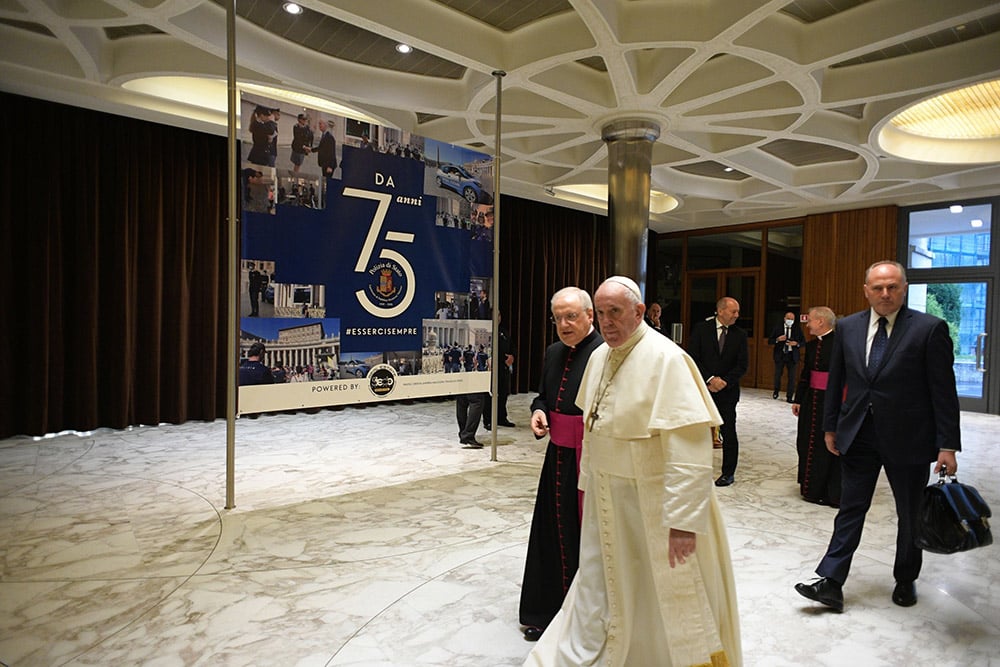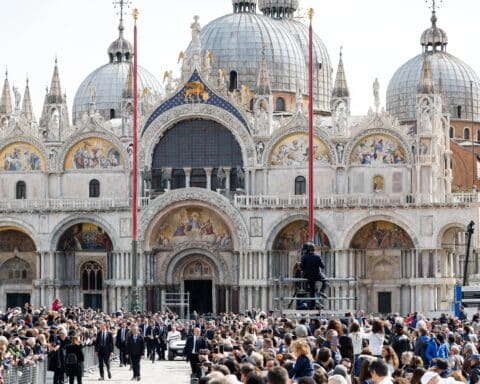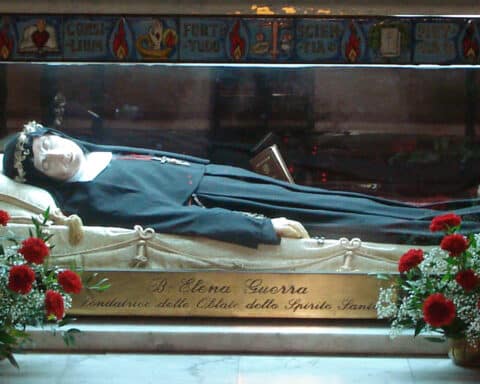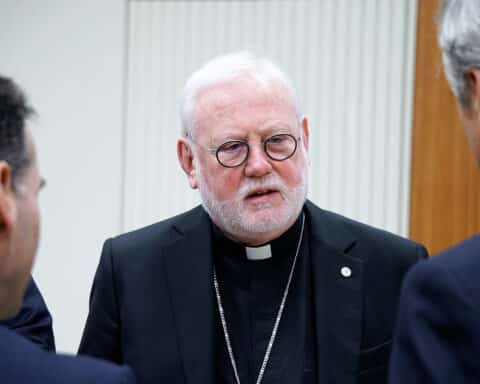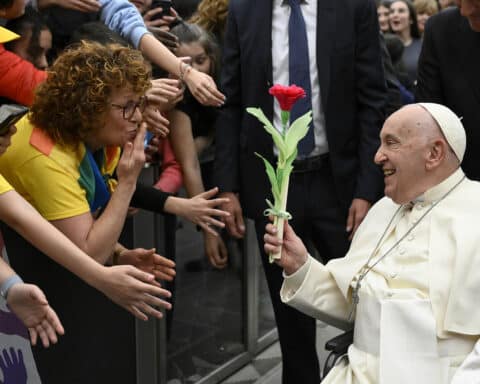This fall, the Vatican Inspectorate of Public Security celebrated the 75th anniversary of its founding. Technically Italian police, these authorities are responsible for all security — even extraterritorial Vatican territory — of St. Peter’s Square and for entering the small sovereign state located in Italian borders. This one-of-a-kind agreement goes back to the Lateran Treaty of 1929, which reconciled Italy and the Vatican; subsequently, at the end of World War II in 1945, the Inspectorate was instituted.
In an exclusive interview with Our Sunday Visitor, Luigi Carnevale, the director of the Inspectorate, said, “We live each encounter with the pope with renewed enthusiasm and emotion.”
“We feel St. Peter’s Square is ‘our place,’ not only from a working point of view, but also from an emotional point of view,” he said, acknowledging: “There is no distinction between weekdays and holidays, nor between summer and winter.”
Carnevale explained how the Inspectorate has evolved over the years to safeguard against certain risks, such as terrorism, and shared some of his own stories from his experience on the force.
Our Sunday Visitor: You serve as the director of the Italian State Police to the pope and the Holy See. Was that your expectation when you embarked on a career as a police officer?
Director Luigi Carnevale: Beginning my police education, I cannot help but recall a very emotional, potent moment. There, they handed us a book of blank pages, and told us we should write those pages ourselves, with the stories we would have experienced in our profession.
Our Sunday Visitor: Now, in that “book,” is there a special encounter or conversation with Pope Francis?
Carnevale: I’m telling the truth; I can’t name just one. But when the pope returns home from a trip, even after a 12-hour flight, and arrives at the Porta del Perugino, the Vatican entrance next to the pope’s residence, he stops to thank us who escort him and the guards at the entrance. He calls our agents “acrobats” and with his arm, mimics the slalom that they do when escorting him around the cars [like in skiing]. Generally, this is an opportunity to exchange some nice jokes. And for us, making him smile is already a source of satisfaction.
Our Sunday Visitor: Francis loves close contact with people. How do you ensure his safety?
Carnevale: It is a difficult task. The pope is not just any personality; he is a head of state and head of the Catholic Church, a universal moral authority. To exercise this function, he needs contact with God’s people and they need him. We have to respect this need. It isn’t easy, but when we succeed it gives great satisfaction. But what distinguishes our work is also the strong collaboration with the Vatican gendarmerie, a relationship of professionalism, but also of friendship, which makes it more profitable, and the same also applies to the Swiss Guard.
Our Sunday Visitor: How many agents are there in the Vatican Police Inspectorate?
Carnevale: We are approximately 160. Many are employed 24 hours a day in surveillance shifts in St. Peter’s Square, a square that today requires very different security measures from those of 30 or 40 years ago. The attack on John Paul II on May 13, 1981, was indisputably a turning point.
Our Sunday Visitor: What role did the Inspectorate play in the events of that day?
Carnevale: There are images that portray the director at the time, Francesco Pasanisi, who immediately got into the pope’s car. … And while the director was holding and helping the wounded pope, the Inspectorate staff had already identified and arrested the bomber, Ali Agca, responding to the emergency with the greatest possible efficiency.
Our Sunday Visitor: What happened after that dramatic day?
Carnevale: Restrictions were implemented on entry at official ceremonies, which were further implemented starting with the Jubilee of 2000 and increasingly after the September 11, 2001, terror attacks in the United States, with the emergence of terrorism threats. But it is our task to guarantee not only safety, but also tranquility and serenity for the faithful and visitors.
Our Sunday Visitor: Is there a risk of terrorism in the Vatican?
Carnevale: St. Peter’s Square is by definition a place at risk. We have not let our guard down even during the pandemic, when we were alone in the square. But the moments that seem least conducive to an attack are those that require the most attention. But this must never affect our availability towards those who arrive in the streets. We must ensure that the spirituality that those places emanate remains intact and is perceived well by all visitors.
Our Sunday Visitor: When did you start filtering the inputs to the metal detector?
Carnevale: Right after the attack on St. John Paul II. First, we started with manual metal detectors, whose function was indispensable at the time. Later, other machines were also used, which are the same as those used in airports.
Our Sunday Visitor: When there is no pope in the square, but tourists and pilgrims, what are the most common crimes committed?
Carnevale: St. Peter’s Square is a place where not many crimes are committed. The security in the square now is quite strict. Sometimes there are attempts to carry out protests by individuals or certain categories, because the square is a stage that can ensure them a great media coverage. Often these events can be violent or involve desecration. We must prevent acts of self-harm, intervene even in cases of need for first aid. Several times, we saved lives.
Our Sunday Visitor: Could you share one of these episodes?
Carnevale: Six years ago, when I was deputy director of the Vatican Inspectorate, two members of the so-called Italian “Pitchfork” movement showed up in the square in the early afternoon of Feb. 11, 2014, with a bottle of petroleum and a lighter with them. They threatened to set themselves on fire if the pope did not receive them. The negotiations went on for a long time, and they began to show impatience. So, I took responsibility for an initiative. I neutralized one of them by kicking the bottle the man was holding. Then another collaborator of mine threw himself with a blanket at the other demonstrator, who was already pouring petroleum on his head. Doing so, we were able to stop them.
Our Sunday Visitor: Around St. Peter’s Square there are many homeless people, to whom Pope Francis has dedicated various services, such as showers, shelter and meals.
Carnevale: Sometimes, the homeless people are not able to realize the condition of discomfort they can create. But it is clear that we are required to be more sensitive than our colleagues in the local offices operating in Rome. Humanity marks our work, but greater effort is required here, because here we are also under observation for this.
Deborah Castellano Lubov writes from Rome.

